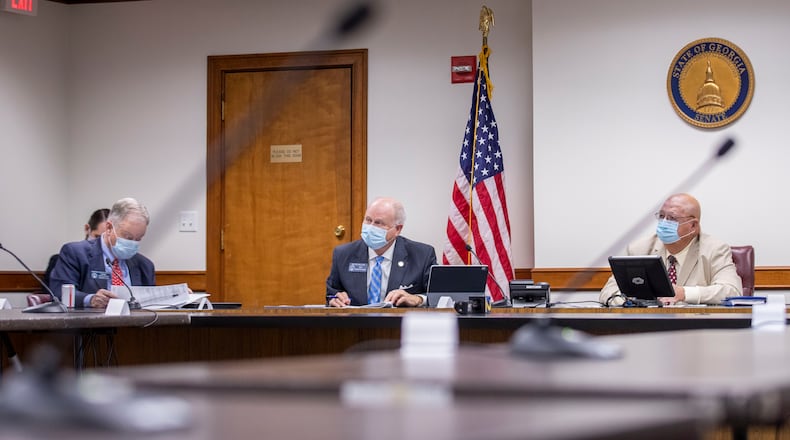The Georgia General Assembly returns Monday after a three-month coronavirus pandemic suspension facing more than $2 billion in spending cuts, a debate over hate-crimes legislation and likely thousands of social justice protesters.
Lawmakers suspended the 2020 session in mid-March with 11 working days remaining as the virus spread across the state.
Most of the serious business each session gets done in the final days, so the suspension left a lot of work undone.
The pandemic has caused a massive recession, with record unemployment and thousands of business either closed or struggling to remain open. That, in turn, has sent state tax collections - mostly income and sales taxes - plummeting.
Lawmakers must, by law, pass a budget before the new fiscal year starts July 1 - and they face cutting about $2.6 billion for everything from K-12 schools and universities to the state patrol, food safety inspections, highway construction, mental health and substance abuse programs and county health department funding.
While the budget will be a priority, they will also debate creating a new hate-crimes law at a time when recent police killings of black men and the shooting of an unarmed black jogger near Brunswick have increased the call for reform.
The measure would allow stiffer sentences for anyone convicted of targeting a victim based on race, color, religion, national origin, sexual orientation, gender, mental disability or physical disability.
Democrats have long sought passage of the law, and Republican House Speaker David Ralston has very publicly advocated for it.
But some powerful Senate leaders have raised objections, including Jesse Stone, the Republican chairman of the Senate Judiciary Committee. Lt. Gov. Geoff Duncan, the Senate’s president, wants changes to the House measure that he says would strengthen it. That means even if a version is approved by the Senate, it would have to return to the House for another vote, and it barely got enough support to pass the last time.
Georgia is one of four states in the nation without such a measure after a previous law was declared unconstitutional in 2004.
Major health groups will also be making a big push to raise Georgia’s relatively low tobacco tax in order to raise an estimated $575 million a year. Georgia’s tobacco tax is among the lowest in the country and hasn’t been increased since 2003.
Because General Assembly sessions typically mean crowded meeting rooms and halls outside the House and Senate chambers, they create a target-rich environment for diseases such as COVID-19.
Starting Monday. lawmakers will be spread out, with some in the chamber in their seats, and many not. Lawmakers presenting bills will be speaking to partially empty chambers. Most senators will watch the presentation of bills on a stream from their office or elsewhere outside the chamber and be brought in to vote, according to Senate leaders. House members will be dispersed throughout the chamber and public galleries, and there will be a roll call of members when they have to vote on bills.
House members will be required to wear masks; Senators will not, although mask usage is encouraged. Temperature scanners will be set up at building entrances. What goes on in the chambers and during committee meetings will be streamed to anyone who wants to watch.
Meanwhile, outside the building, thousands are expected to attend a Georgia NAACP march on Monday to demand that lawmakers overhaul the criminal justice system and address "electoral failures" after last week's primary was marred by long lines and malfunctioning machines.
Organizers of the “March on Georgia” will call on legislators to repeal citizen’s arrest rules, take steps to restrict police violence and block new elections rules that Democrats fear could sow confusion.
The march took on added significance with the police shooting of Rayshard Brooks in a Wendy's parking lot Friday night. The shooting brought protests over the weekend and the Wendy's was set ablaze.
About the Author
Keep Reading
The Latest
Featured





